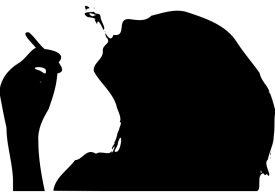Chronic Tension-Type Headache and Chronic Migraine: Profiles
Profiling is so dangerous, isn’t it? I mean, seriously. As soon as you say something like “most migraineurs are women”, you’re leaving out huge numbers of us who ain’t. Or if you say “migraineurs tend to be fat” you beg all kinds of questions – is it due to the medication they’re taking? The time they spend in bed? Is obesity a migraine trigger? Are we “blaming” people who are overweight? Did I just use the “f-word” in this post??
 |
Sure, profiles are interesting. Maybe they allow us to focus more on women instead of men, since they have more migraine attacks. Wait! I don’t like that idea either. We all need help, and we’re all very different!
But these types of generalities can be useful – as long as we’re careful with them. They can point to tendencies. To possible biological realities of migraine disease. And to possible treatments.
But don’t tell me migraineurs are all depressed, or all women, or all f … frugal… or whatever.
This is actually more of a comparison than a profile. What’s the difference between those with chronic tension-type headache and those with chronic migraine – from The Journal of Headache and Pain.
| Chronic TTH | Chronic Migraine |
| Less common | More common |
| Less likely to be female | More likely to be female |
| More likely to drink alcohol | Less likely to drink alcohol |
| Less likely to smoke | More likely to smoke |
| Less likely to be obese | More likely to be obese |
| Less likely to report frequent acute pain drug use | More likely to report frequent acute pain drug use |
| More likely to be low educated | Less likely to be low educated |
This study may be even more useful in understanding chronic tension-type headache. After all, a lot of the right column is pretty well known. This is particularly true for weight issues (a struggle for migraineurs due to medication, and also a very possible factor in developing chronic migraine) and pain drug use (medication overuse is a HUGE factor when it comes to chronic migraine).
Could alcohol use influence chronic tension-type headache? Or lifestyle issues related to a lower education?
But one of the problems with a study like this is that many people seem to have both conditions. And there is increasing evidence that both conditions are related.
Do you suffer from chronic tension-type headache? Have you found a direct link with alcohol consumption in particular? Or, as a migraineur, have you found weight loss to be a help? Or quitting smoking?
For more details: Epidemiological profiles of patients with chronic migraine and chronic tension-type headache.

21 May 2013 @ 5:57 pm
I have 3 types of headaches (spike, cluster and migraines) the migraines respond best with smoking pot(indica type((short, fat leaves)) it works best for those, it is a relaxer). Clusters respond to Sativa(( thin, long leaves))( it keeps me active) but nothing works for the spike headaches.I have had these whether I have been fat or in good shape, I have never in my life smoked cigarettes, whether I drink or not, I don’t drink caffeine hardly at all, and have change my diet many times over the years. I have taken several different meds over the years, had MRIs and CT scans, kept journals of frequency and severity. This is an option that should be explored.
23 May 2013 @ 9:46 am
its happen wid me freqently offf i wanna die :'(
23 May 2013 @ 12:24 pm
What is the headache that is on my eyebrows on my cheeks and is like a fullness type of pain?
30 May 2013 @ 11:08 am
There are two small muscles over the eye browns called corrugator muscles which are strongly implicated in migraine. you use them to frown and protect the eyes from glaring sun, water and soaps from washing and showering. You are in control of them so tell them to relax and avoid/change situations where they contract
24 May 2013 @ 9:05 am
^ Sounds sinus type to me, Susan– or maybe vision? (but I honestly don’t know- Hope u feel better soon)